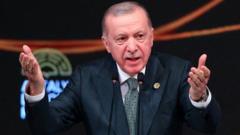In a recent press conference, Turkish President Recep Tayyip Erdogan firmly rejected claims that he is attempting to alter the constitution in order to extend his presidency beyond the term ending in 2028. Having helmed Turkey for the past 22 years, first as prime minister and then president, Erdogan stressed his commitment to a new constitution for the nation's benefit, dismissing any personal motivations for remaining in power.
"We want the new constitution not for ourselves, but for our country," he stated, adding, "I have no interest in being re-elected or running for office again." However, speculation surrounding Erdogan's intentions has intensified after a series of comments and political maneuvers raised eyebrows.
Earlier this year during a public event, when questioned by a singer about running for another term, his light-hearted affirmative response prompted his party’s spokesperson to indicate that the issue was indeed being considered, claiming, "What is important is that our nation wants it." As Erdogan wrestles with sagging approval ratings, particularly in light of his opposition from Istanbul's mayor, Ekrem Imamoglu, the political landscape is becoming increasingly fraught.
Imamoglu, who is currently imprisoned on corruption charges—a claim he denies—has seen a rise in popular support and has been viewed as a formidable challenger. His detention has ignited nationwide protests and reactions from the international community, spotlighting the perceived political motivations behind the ruling party's actions.
Erdogan's latest assertions regarding Turkey's constitution, which he argues fails to reflect modern societal values, seem to maneuver towards preparation for potential legislative change. The current constitution restricts presidents to two five-year terms—a stipulation that becomes a barrier for Erdogan's future ambitions, unless the rules are revised.
To amend the constitution, Erdogan would require a parliamentary majority of 360 votes out of 600, but his current coalition only holds 321 seats. He has pointed to a renewed dialogue with the PKK, a Kurdish militant group, as a strategic move to gain support from the pro-Kurdish HDP party, which includes 56 MPs.
Despite the growing discourse around electoral strategies, opposition leaders, like those in Imamoglu's CHP party, assert that Erdogan's path to a renewed presidency is obstructed by the very constitutional parameters he legislated. While he could theoretically call for early elections, Erdogan's refusal to consider this option further complicates the political dynamic as the nation anticipates significant developments in the coming years.



















